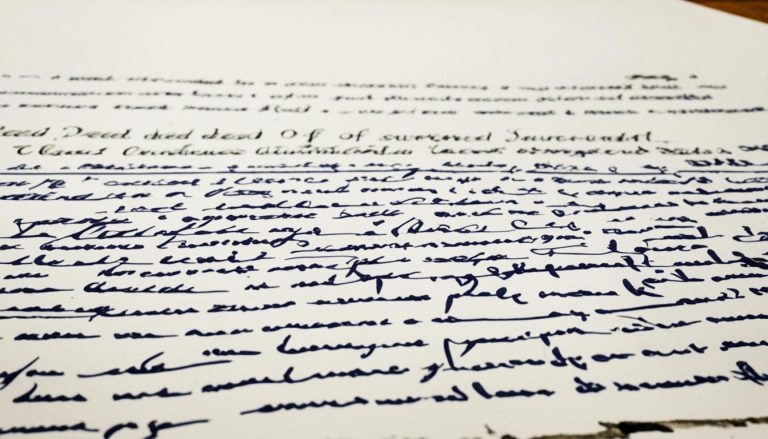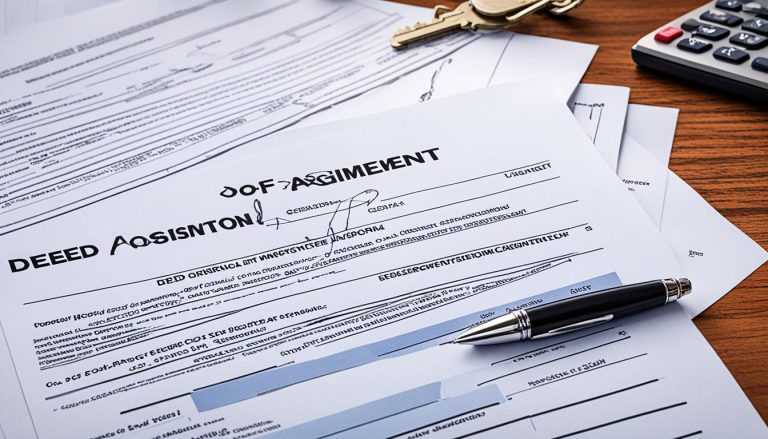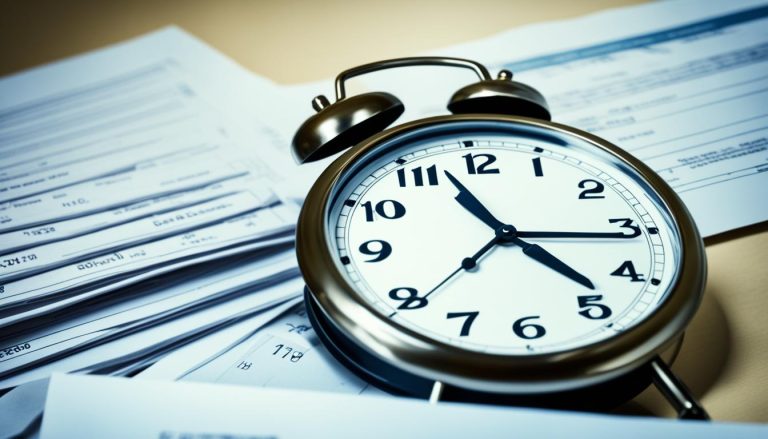Welcome to our guide on title deeds, the essential documents that serve as proof of ownership for properties in the United Kingdom. If you’re wondering what a title deed is, its meaning, and why it’s important, you’ve come to the right place.
What is a Title Deed?
A title deed is a legal document that provides evidence of your ownership of a piece of land or property. It serves as a property ownership document and outlines the chain of ownership, including conveyances, contracts for sale, wills, mortgages, and leases. Title deeds are crucial as they establish your legal rights to the land or property.
When buying a property, the original title deeds are typically held by the solicitor or conveyancer who facilitated the transaction. It’s important to note that HM Land Registry, the government organization responsible for land registration in England and Wales, does not store paper title deeds. Instead, they maintain digital records.
If your property is registered with HM Land Registry, you may not require the original title deeds to confirm ownership. However, keeping the original deeds in a safe place is advisable, as they may contain additional information about legal boundaries or previous owners.
Where are Title Deeds Kept?
When it comes to the importance of title deed, knowing where these land registration documents are kept is crucial. While HM Land Registry stores digital records of title deeds, they do not keep the original paper documents. The process for title deed rights varies depending on whether a property is being registered for the first time or is already registered at the time of purchase.
If a property is being registered for the first time, the original title deeds are required by HM Land Registry to prepare the register. Once the registration process is complete, the original deeds are usually returned to the solicitor or conveyancer who lodged them. On the other hand, if a property is already registered, the seller may not hand over the original deeds to the buyer.
The exact location of the title deeds will depend on who handled the property transaction and whether there is a mortgage involved. It is important for property owners to keep the original deeds in a safe place, as they may be needed for future transactions or legal purposes.

The Title Deed Process
The title deed process involves several steps to ensure the legal rights to land are properly documented. Here is a brief overview:
- Property Transaction: A property transaction takes place, either a purchase or transfer of ownership.
- Document Preparation: The solicitor or conveyancer prepares the necessary documents, including the title deeds, to be lodged with HM Land Registry.
- Lodging the Deeds: The solicitor or conveyancer lodges the title deeds with HM Land Registry, either digitally or as original paper documents, depending on the property’s registration status.
- Registration: If the property is being registered for the first time, HM Land Registry examines the title deeds and prepares the register. If the property is already registered, HM Land Registry updates the register to reflect the change in ownership.
- Return or Release of Deeds: The deeds are either returned to the solicitor or conveyancer who lodged them or released to the new owner, depending on the circumstances.
By understanding the title deed process and the importance of these documents, property owners can ensure the legal rights to their land are protected.
How to Access Your Title Deeds?
If you want to access a scanned copy of your title deeds, you can perform a title deed search on the HM Land Registry website. This search requires your property’s title number, which can usually be obtained from your solicitor or conveyancer.
The HM Land Registry register will indicate if the deeds have been filed. If they are filed, it means that HM Land Registry will have copies of the deeds available for download. However, please note that these copies are not considered official proof of ownership, but rather real estate documents you can use for reference.
It’s important to mention that there may be a small fee associated with obtaining copies of your title deeds from HM Land Registry. This fee contributes to the administrative costs of providing access to these important legal documents.
If you need to demonstrate legal rights to land or prove ownership for a court case or other legal purposes, it is recommended to obtain official copies of the title register from HM Land Registry. These official documents carry more weight in legal proceedings and provide the necessary legal evidence.
Land Registry Certificate
To obtain the land registry certificate, you can request it from HM Land Registry directly. The land registry certificate is an official document that confirms the ownership and legal rights to a specific property. It contains vital details, such as the property’s boundaries, registered proprietor, charges, and other relevant information.
When applying for the land registry certificate, ensure you provide accurate information about the property, including the address and title number. This will help expedite the process and ensure you receive the correct document.
Real Estate Document and Legal Rights
Your title deeds are essential real estate documents that establish your legal rights to land and property. They serve as evidence of ownership and provide valuable information about the history of the property’s ownership chain.
While accessing your title deeds through HM Land Registry can provide convenience and ease of use, it is crucial to recognize the distinction between digital copies and official proof of ownership. Always consult official land registry documents when legal rights to land need to be demonstrated.

What to Do If You Lose Your Title Deeds?
If you find yourself in a situation where you have lost your property conveyancing papers, also known as title deeds, there are steps you can take to rectify the situation. Losing these documents can be stressful, but it’s important to remain calm and follow the appropriate procedures to ensure the smooth transfer of property ownership.
If your title deeds were lost by your mortgage provider or conveyancer, you may be relieved to know that they have the responsibility to issue replacement copies at no cost to you. Reach out to them for further guidance and to begin the process of obtaining the necessary documents.
On the other hand, if the title deeds were lost while in your possession, you will need to contact HM Land Registry to inform them of the situation. Provide detailed information on how the documents were lost, as this will help them determine the appropriate course of action. In some cases, they may require a surveyor to inspect the property before issuing replacement deeds.
It is important to remember that losing your title deeds can be a complicated situation, and there may be specific requirements or processes that must be followed. Seeking professional advice from a solicitor or conveyancer is advisable to ensure you navigate the process smoothly.
To avoid the need for replacement copies and potential complications, it is crucial to keep your title deeds in a safe place. Consider utilizing a secure storage option such as a safety deposit box or a fireproof safe in your home. By taking proactive measures to safeguard your property’s title deeds, you can minimize the risk of loss or damage.
Remember, title deeds are crucial legal documents that provide evidence of title transfer and ownership. By being proactive in protecting and storing your title deeds, you can easily access and refer to them whenever necessary.

Steps to Take If You Lose Your Title Deeds
| Step | Action |
|---|---|
| 1 | Contact your mortgage provider or conveyancer if they lost the deeds |
| 2 | Notify HM Land Registry of the lost deeds and provide details |
| 3 | Follow any instructions provided by HM Land Registry, which may include property inspections |
| 4 | Consider seeking professional advice from a solicitor or conveyancer for guidance throughout the process |
| 5 | Securely store your title deeds to prevent loss or damage |
Conclusion
Property ownership is a significant undertaking, and having the necessary property ownership documents is crucial for establishing your rightful ownership. Title deeds serve as concrete proof of transfer of property ownership, showing the chain of ownership and the legal rights associated with the property.
While the traditional land registry title deeds are no longer stored in paper form, the HM Land Registry provides digital records and scanned copies of some deeds for reference. However, it is still advisable to safeguard the original title deeds to ensure their availability and protect against potential complications.
By keeping the original property ownership documents in a secure location, you can avoid the need for replacement copies and streamline any future legal or transactional processes. In the event of loss or destruction of the deeds, you can apply for replacements, although the application process may involve some complexity.






